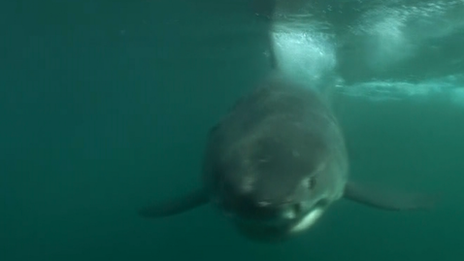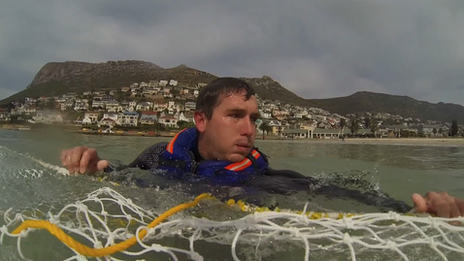Will nets halt South Africa's shark attacks?
- Published
Two surfers in South Africa talk about their escape from a shark attack
You can smell them before you see them: a 20-minute boat ride out to sea from South Africa's coast takes you to False Bay, home to a huge colony of seals.
It is one of the key attractions for visitors to the Western Cape - a quarter of a million British visitors holiday here every year.
But the region is also important territory for one of the most feared predators of the deep - the great white shark.
Within minutes of our boat coming to rest, a 3.5m beast emerges from the depths below and picks off an injured seal.
This is nature: raw and real.
It feels even more raw and real being hoisted down in a small metal cage to take a closer look.
These vast creatures demand respect and, despite their serrated teeth, which are replenished at an astonishingly efficient rate, they are also misunderstood.

Up until now the coast has relied on shark spotters to warn swimmers
In an effort to calm my nerves, and looking for signs of sudden movement among the shoals of fish dancing in front of my eyes, I try to remember that, statistically speaking, more sharks are killed by humans than the other way around.
Yet the great white shark has become a threat to Cape Town's tourist industry by straying close to the region's popular beaches.
Five people have been killed in a little over a decade in South Africa and, according to official figures, there have been five attacks by great whites in 2012.
The authorities have been forced to take drastic measures after years of resistance by conservationists.
Now as part of an $80,000 (£50,000) experiment, they are deploying shark nets for the first time.
'Shark traps'
Traditional shark nets are highly controversial.
The type deployed further up the coast in Durban are anchored gill nets that conservationists claim have killed 600 sharks and other sea creatures in the past year.
The Western Cape will have none of it.
"Those types are designed to trap sharks," says Sarah Titley from the conservation group Shark Spotters. The sharks "get stuck and they die".

The net being trialled is roughly the size of two rugby fields
But the group has been co-opted on to the Cape Town project to help co-ordinate a trial of what is being billed as a "world first" - a customised, environmentally friendly shark net that acts as a barrier, not a trap.
The net is being piloted off the coast of Fish Hoek, where in 2011 the image of a British man, Michael Cohen, being plucked from the ocean heavily bleeding after a shark attack was beamed on television sets around the world.
Just as horrifying were the images of the shark languishing close by after the attack.
The net being piloted here is similar to the barrier nets used in Hong Kong and the Seychelles but it has been customised to meet the conservationists' demands.
Deployed early in the morning by a team of fishermen, the thin-meshed net has been designed to be removed at night.
Roughly the size of two rugby fields it is a highly labour-intensive operation, which explains the high cost.
Expensive
"The net falls down to the sea floor and creates an exclusion zone, so people on the inside can swim without other marine creatures coming into that area," Sarah Titley explains.
And because the mesh size is very small, only about 4cm (1.57inches), "no sharks should get stuck", she says.
Up until now the coast has relied on an army of shark spotters.
They are not being done out of a job, and form part of a highly successful early warning system which has alerted swimmers to 1,400 sharks since it started in 2004.
"But the spotters can't get people out of the water quickly enough," admits Gregg Oelofse from Cape Town's Environmental Resource Management team.
It is expensive, he says, to deploy removable shark nets.
But in order to balance the demand to protect humans with the need to preserve shark populations as kings of the food chain, it is a price he believes taxpayers will be prepared to pay.
For a tourism industry that nets in the region of $2.2bn a year, it may be a long-term investment in Cape Town's image.
Everyone seems to have a shark story in this part of the world.
A group of pensioners swim each morning at Fish Hoek at 07:00, despite the fact that one of their number, Tyna Webb, was killed and eaten by a shark, in an horrific incident in 2004.
To them the nets offer some relief.
But there is also a strong sense that man and beast must live together.
Lyle Maarsdorp had a huge chunk bitten out of his surf ski when he mistook a rock for a shark.
"The shark was too busy biting at the ski than to notice me in the water," he says, not boastfully but calmly.
Miraculously he survived unscathed.
And though he applauds the use of nets "especially for the small kids learning to be life savers" he knows that sharks play a vital role in the Western Cape's ecosystem.
Any instinct to drive them away, he believes, would have devastating consequences.
- Published19 May 2012
- Published31 January 2013
- Published15 May 2012